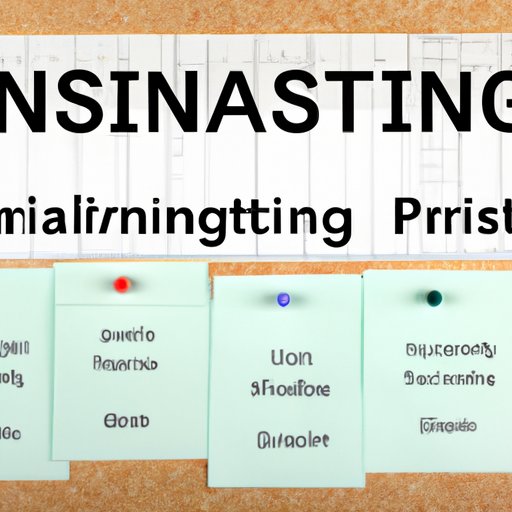
I. Introduction
Are you considering obtaining a marketing degree? Marketing is an essential component of any business, and a degree in this field can provide you with invaluable skills and knowledge. However, pursuing a degree is a significant investment of time and money. In this article, we will explore whether a marketing degree is worth it for you. We will compare the advantages and disadvantages of having a marketing degree versus working in the industry without one. We will also analyze job postings in the field, success stories from marketing professionals, the costs of obtaining a degree, and the benefits of specific marketing certifications. We hope to provide you with a comprehensive evaluation so you can make an informed decision about pursuing a marketing degree.
II. Benefits of Obtaining a Marketing Degree vs. Working Without One
Having a marketing degree can give you a competitive edge over those who do not have one. It provides you with a thorough understanding of marketing principles, research methods, and market analysis techniques. Additionally, obtaining a degree signals to potential employers that you are dedicated and have invested time and resources into your education.
On the other hand, working in the industry without a degree can still lead to success in marketing. Hands-on experience and a talent for communication and innovation are crucial in this field. Individuals can start in entry-level positions, work their way up through the ranks and learn on the job.
III. Success Stories and Quotes from Successful Marketing Professionals
Many successful marketing professionals started without a degree and worked their way up. Steve Jobs, founder of Apple, is an example of this. Jobs never graduated college but took classes that interested him and developed a passion for computer science. He went on to become a marketing and design genius and built one of the most successful brands in the world.
In contrast, other successful marketers have attributed their success to obtaining a marketing degree. Gary Vaynerchuk, entrepreneur, author, and internet personality, graduated from Mount Ida College with a marketing degree. He believes his degree helped him understand the fundamentals of marketing and introduced him to a broader network of people in the industry.
There are many marketing professionals who are successful with and without a degree, so it’s essential to find what works best for you.

IV. Analyzing Job Postings in the Marketing Field
According to a survey of over 20,000 job postings on Glassdoor, approximately 40% of marketing positions require a bachelor’s degree or higher. This stat, however, doesn’t take into account job requirements in specific industries or locations.
What do these figures mean? It’s possible to have a successful career in marketing without a degree, but it may limit your job prospects. If you’re looking to work for a larger corporation or compete for higher-level positions, a marketing degree may be an advantage.
V. Costs of a Marketing Degree
Like any degree, the cost of obtaining a marketing degree can be expensive. Tuition, textbooks, and fees can add up, and pursuing a degree can result in lost income during schooling.
Additionally, the value of obtaining a degree may vary based on the institution and program you choose. Fortunately, there are many online and traditional programs to choose from at various price points.
Crunching the numbers and weighing the investment of time and money is essential when considering a marketing degree.
VI. Comparing Marketing Certifications vs. Obtaining a Degree
Marketing certifications, like Google Ads certification and Hubspot Inbound Marketing Certification, provide specific knowledge that may be more suitable for certain careers than a broader marketing degree. Obtaining a marketing certification can be a more affordable and faster option.
However, a marketing degree provides a well-rounded education, professional and personal development opportunities, and more in-depth knowledge of marketing principles. Depending on your career goals and objectives, a degree may be more beneficial in the long term.
VII. Professional and Personal Skills Students Learn in Marketing Degree Programs
Marketing degree programs provide opportunities to develop technical skills in digital marketing, market research, and consumer behavior analysis. Students also receive professional development in areas such as public speaking, problem-solving, and leadership.
The interpersonal and communication skills that students can learn in marketing degree programs can positively impact their personal lives and relationships, making a marketing degree an investment in themselves.
VIII. Conclusion
In conclusion, a marketing degree can provide you with the skills and knowledge to compete in a competitive and continually evolving field. However, it’s not always necessary to succeed in marketing. Considering the costs and potential job prospects, it’s essential to evaluate what’s best for your career goals.
Our recommendation is to weigh the pros and cons and determine what works best for you. Ultimately, a marketing degree can be worth it if it helps you achieve your career goals and if you have the financial resources to make an investment in your future.
As you move forward in your decision-making process, we wish you the best of luck in your marketing career or schooling journey.





